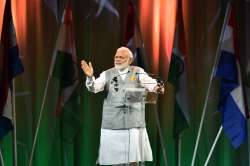You are our 'rashtradoots' to the world, Narendra Modi tells Indian diaspora in Netherlands
The embassy staff and officials are called 'Rajdoots', and Indian diaspora are the 'Rashtradoots' to the world, Modi said.

Prime Minister Narendra Modi on Tuesday announced that India will soon take a decision on granting five-year business and tourist visa to Dutch passport holders. The Prime Minister made the announcement while addressing the Indian diaspora in The Hague just before concluding his day-long visit to The Netherlands, the last stop in his three-nation tour that also included Portugal and the US.
The Netherlands has the second largest population of the people of Indian origin after the UK. In his speech that lasted little less than an hour, Modi mostly focussed on his government's efforts aimed at women's empowerment as he talked about the endeavour to ensure progress and modernisation of India.
He referred to the contribution of the 50 per cent of the population in areas like dairy, farming, teaching, healthcare and entrepreneurship.
Modi said the women were also going into new frontiers including flying fighter jets and space and bagging awards in international competitions like Olympics.
"The role of women in the agriculture sector, cooperatives is very important. India's Nari Shakti is contributing to India's progress," Modi said.
Referring to members of Indian diaspora as 'rashtradoot', Modi said his government do not see the colour of people's passports.
"The colours of our passport may be anything, but our ties are that of blood and our ties are very special. The embassy staff, the officials they are called 'Rajdoots' but you, the diaspora are the 'Rashtradoots'," Modi said.
He highlighted the diversity existing in India and said it was the country's "speciality" which puzzled people in other parts of the world. "India is a federal country in true spirit," he said as he wound up his three-nation tour which took him to the US and Portugal too.
The prime minister said his government's thrust has been on "jan bhagidari" (people's involvement) in governance as he believed that the country's progress cannot be ensured only through the government's work.
In this context, he referred to construction of toilets under the Swacch Bharat campaign.
He mentioned about various initiatives taken by his government in the sectors like banking, energy and digitalisation and talked about progress being made in areas like space, healthcare and sanitation.
The prime minister said India not only needs progress, but also modernisation in all areas.
"The 21st century India should not lag in global standards in infrastructure and other areas," the prime minister told the gathering of about 3000 in Hindi amid repeated chants of 'Modi Modi'.
He said while the earlier governments also have done work, they could satisfy the amibitions by done "one or two tasks".
However, the aspirations in India have grown so much that the people expected much more development and modernisation, he said.
Taking the example of power, Modi said his government had set an ambitious target of generating 175 gigawatt of renewable energy, that too at rapid pace.
"For some of you, gigawatt may be a new concept because earlier we never thought beyond megawatt... Now there is a big change," he said.
Referring to solar energy, Modi said its cost has fallen drastically and was almost at par with fossil fuel.
"Did the Sun start appearing only after I became the Prime Minister? Was it not there earlier? I coudl see it but they (previous governments) could not," he said.
Talking about electrification, Modi said when he came to power, he was told that 18,000 villages did not have electricity even 70 years after independence.
He then asked, "What is the difference between 18th century India and 21st century India, if even after 70 years of independence, 18000 villages do not have electricity?"
He said after becoming the prime minister in 2014 he asked officials how long it would take to electrify all the 18000 and was told that it would take 60 years.
"I told them it has to be speeded up.. And then, from the Red Fort on the Independence Day, I announced that the 18000 villages will be electrified in 1000 days. Those 1000 days are yet to end but 13,000-14,000 villages have already been electrified and the work in the rest of the villages is being done at a fast pace," Modi said.
He also said that optical fibre cable is being laid in 2.5 lakh villages to connect their panchayats digitally.
(With PTI inputs)